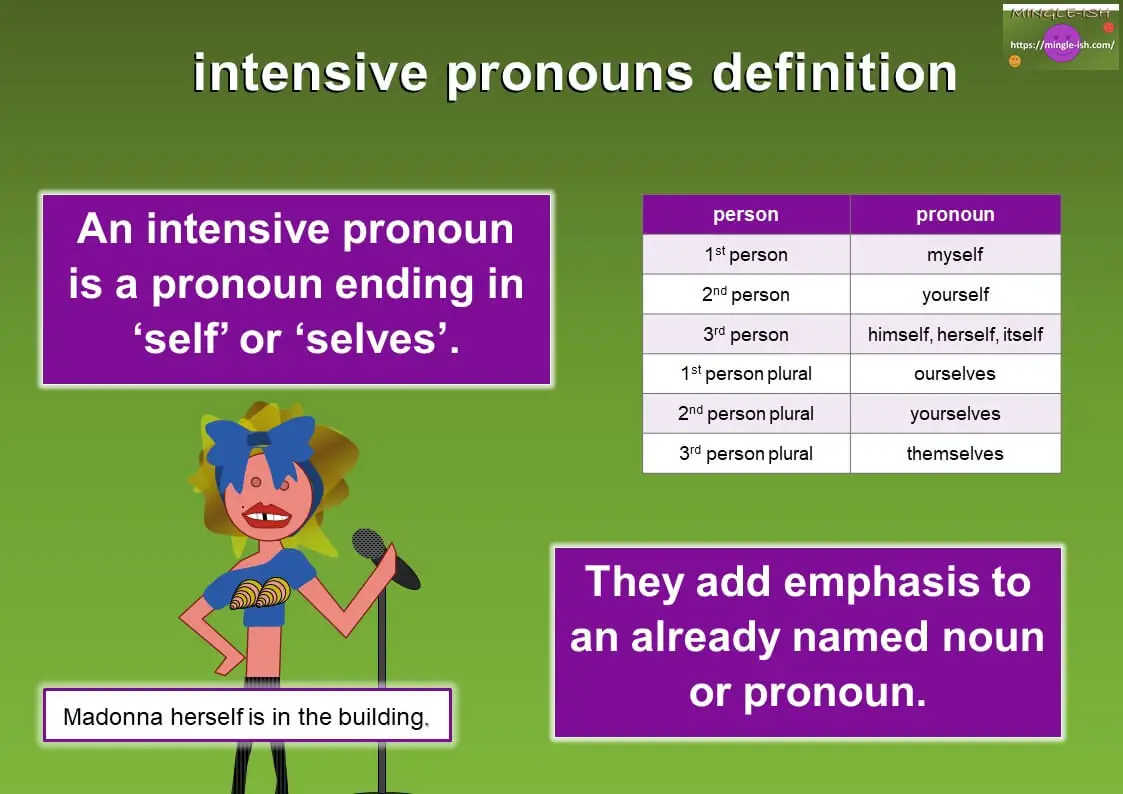
Intensive pronouns definition and examples Mingleish
Intensive pronouns are an essential component of the English language. They are used to emphasize a noun or pronoun in a sentence. Intensive pronouns are formed by adding -self or -selves to reflexive pronouns, such as myself, yourself, himself, herself, itself, ourselves, yourselves, and themselves. Understanding the proper use of intensive.

25 Intensive Pronoun Examples Use, Sentences And Detailed Explanations Lambda Geeks
Soalnya, reflexive pronoun dan intensive pronoun memiliki contoh dan ciri yang sama, tetapi berbeda dari segi fungsi dalam suatu kalimat. a. Reflexive noun merupakan bentuk kata ganti yang digunakan untuk menunjukkan bahwa subjek dalam kalimat melakukan tindakan yang sama dengan objek yang menerima tindakan. Intinya, tindakan tersebut dilakukan.

Pengertian Intensive Pronoun, List Kata dan Contoh Kalimat
Select the Reflexive Pronoun in the sentences below. Remember, reflexive pronouns reflect directly back onto the subject of the sentence and are essential. 1. I found myself at a loss for words when I heard about the upcoming concert being cancelled.. In this sentence, myself is a reflexive pronoun that shows the reader that both the subject and the object of the sentence refer to the same person.

Pronouns ESL Grammar
List of Intensive Pronoun Words. In English grammar, an intensive pronoun is a pronoun that used to add emphasis to the subject of the sentence or antecedent of the sentence. They are similar to the reflexive pronouns but they differ in the basic function. You would be able to find different intensive pronouns right after the noun or pronoun.

Intensive Pronoun Important Rules and Examples • 7ESL
The intensive/reflexive pronouns include myself, yourself, himself, herself, itself, ourselves, yourselves, themselves.. Furthermore, an intensive pronoun is defined as a pronoun that ends in "self" or "selves" and places emphasis on its antecedent.. The Difference Between Reflexive and Intensive Pronouns
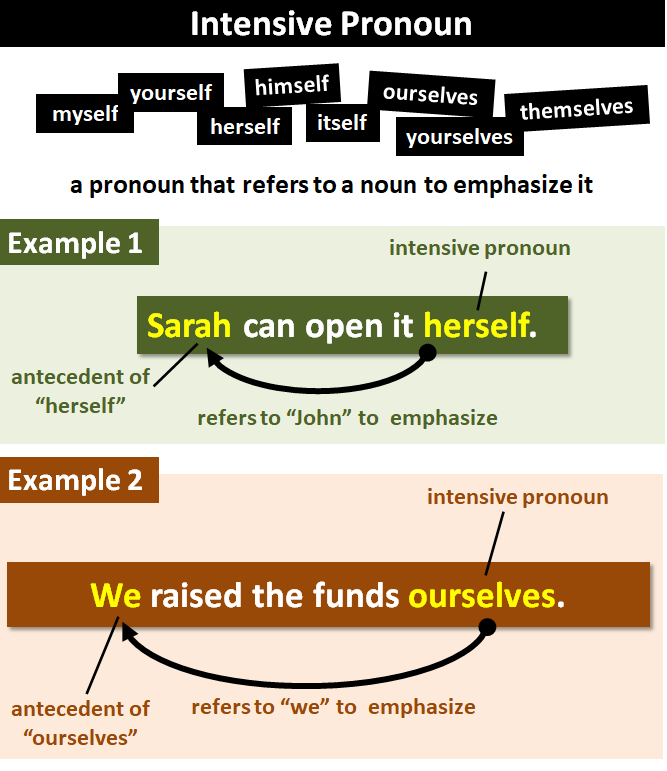
Intensive Pronouns Explanation and Examples
Soal Reflexive Pronoun; Intensive Pronoun. Intensive pronoun adalah kata ganti yang digunakan untuk memberikan penekanan pada antecedent (noun atau pronoun lain yang intensive pronoun di suatu kalimat mengarah kepadanya). Bentuknya sama dengan reflexive pronoun. Contoh Kalimat Intensive Pronoun. The bedroom itself is fine, but the bathroom is.
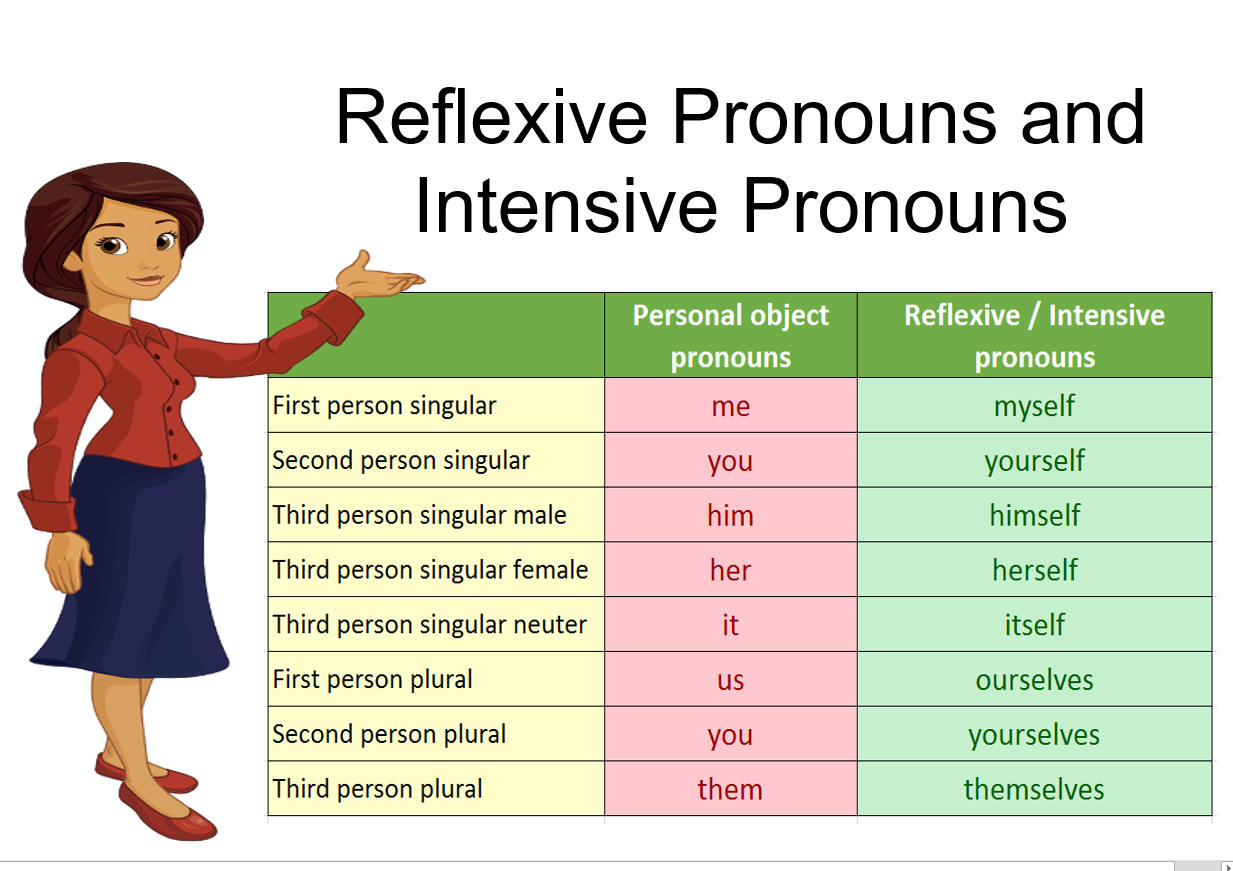
Reflexive Pronouns and Intensive Pronouns in English EnglishTutorHub
Kata ganti dalam intensive pronoun tersebut hampir sama dengan reflexive pronoun, namun memiliki beberapa perbedaan. intensive pronoun tersebut terdiri dari singular dan juga plural. Bentuk singular atau tunggal terdiri dari myself, yourself, herself,himself,itself. Sedangkan bentuk plural atau jamaknya yaitu yourselves, ourselves, themselves.

Intensive Pronoun Important Rules and Examples • 7ESL
The definition of an intensive pronoun is a type of pronoun that emphasizes the subject of the sentence. This subject can be a noun or a personal pronoun. In writing, intensive pronouns always end in the suffixes -self or -selves, like reflexive pronouns. Intensive pronouns or emphatic pronouns emphasize the antecedent, meaning the noun being.
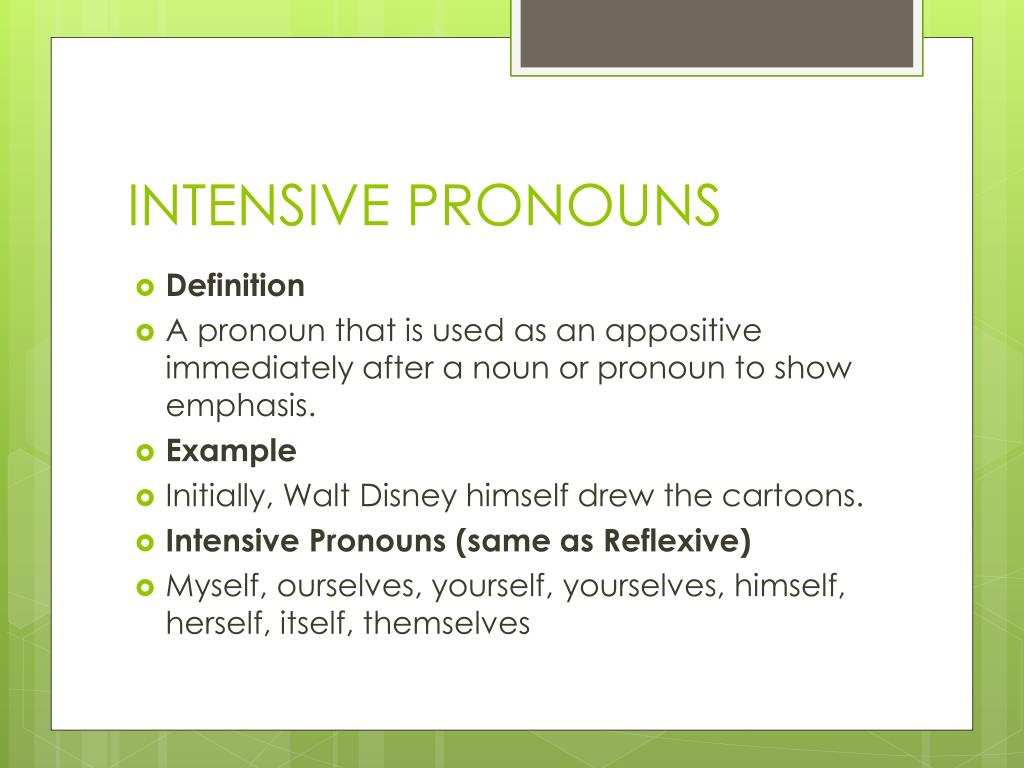
What is an intensive pronoun acanow
Definition. Intensive pronoun. An intensive pronoun adds emphasis to a statement; for example, "I did it myself .". While English intensive pronouns use the same form as reflexive pronouns, an intensive pronoun is different from a reflexive pronoun because it functions as an adverbial or adnominal modifier, not as an argument of a verb.

Pengertian dan Contoh INTENSIVE PRONOUN dalam Bahasa Inggris Joesin YouTube
Intensive pronouns are also known as emphatic pronouns. Using Intensive Pronouns An intensive pronoun refers back to another noun (or pronoun) in the sentence in order to emphasize it. For example: The mayor himself presented the prize. (The mayor is the noun being emphasized. It is called the antecedent of the intensive pronoun. The antecedent.

What Are Intensive Pronouns? Definition & Examples (Worksheet Included)
Singular intensive pronouns are employed when referring to one individual entity. These consist of "myself," "yourself," "himself," "herself," and "itself.". By using these pronouns, we emphasize the action or presence of the subject alone. "I built this house myself.".

9 Jenis, Penjelasan Pronoun Lengkap Beserta Contoh InggrisPRO
Intensive pronoun ini terdiri dari: myself, yourself, herself, himself, dan itself pada bentuk singular (tunggal), dan yourselves, ourselves, dan themselves pada bentuk plural (jamak). Bentuknya sama persis dengan reflexive pronoun. Contoh kalimat intensive pronoun. I myself promise not to corrupt the project.
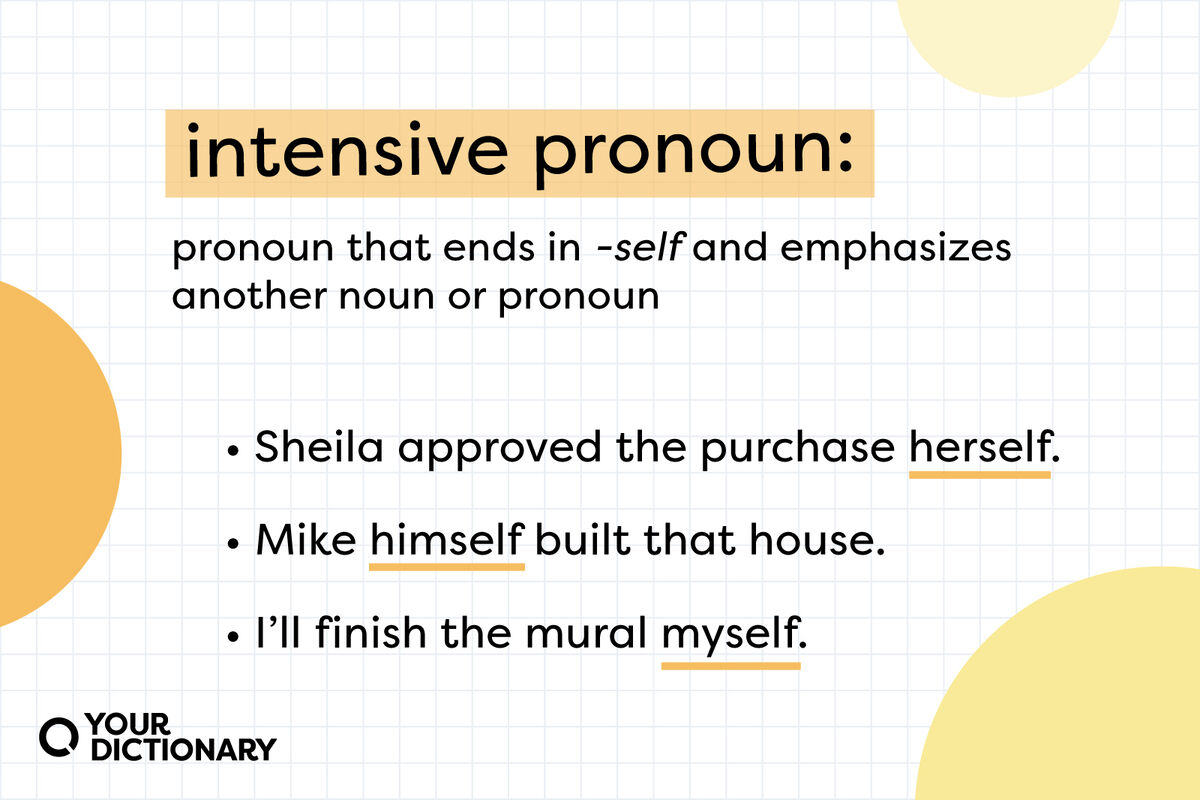
What Is an Intensive Pronoun? Usage Guide and Examples YourDictionary
Purpose. Intensive pronouns are used mainly to highlight a subject or antecedent of a sentence. For such reason, they are alternatively known as self-intensifiers or emphatic pronouns. They include the words that usually ends with "self" or "selves.". Use an intensive pronoun if you want to emphasize your subject.

Intensive pronouns definition and examples Mingleish
An intensive pronoun is a word ending in -self or -selves that is used in combination with a noun or pronoun to place special emphasis on it. For example, "myself" in the sentence "I did it myself" is an intensive pronoun used to emphasize the subject pronoun "I.". The English intensive pronouns are myself, ourselves, yourself.

Intensive pronouns definition and examples Mingleish
An intensive pronoun refers to a noun or pronoun, which is the subject of a clause, and emphasizes it. It adds emphasis or attention to the fact the noun it refers to actually did the action or is what they say they are. It makes the reader/listener take the subject seriously. Note that an intensive pronoun can be removed from the sentence.

Intensive Pronoun definition, usages, examples, and tips
An intensive pronoun is almost identical to a reflexive pronoun. It is defined as a pronoun that ends in self or selves and places emphasis on its antecedent by referring back to another noun or pronoun used earlier in the sentence. For this reason, intensive pronouns are sometimes called emphatic pronouns. Write better and faster Ginger helps.